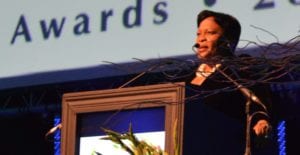“Planning can’t be a project. The project must be releasing water in somebody’s yard, making sure that there is dignified sanitation,” Minister of Water and Sanitation Nomvula Mokonyane told the CESA Aon Engineering Excellence Awards last night (12 August).
Mokonyane was emphasising the need for a ten-year plan for infrastructure that deals with water and sanitation. “We can’t continue to have plans that continue to be designed for three or four years,” she said. This minister called on consulting engineers to help government make a difference in the lives of the people of South Africa. “I’m looking forward to all of you partnering with us, helping this government, claiming the responsibility of realising the objectives of the National Development Plan (NDP),” Mokonyane told those present at the awards. Helping government deliver Mokonyane asked consulting engineers to become partners that can help government deliver within a specified time frame as well as help reposition government to perform with integrity and credible information. She emphasised that consulting engineers can use their knowledge, skill, commitment and loyalty to change the landscape of the country. “You have no option, you must be one of the game changers.”She joked, “You must come to the party, not as people who are going to see financial beneficiation, but people who must impart the knowledge and the skill and appreciation of what needs to be done so that President Zuma and myself can claim in the glory.”
Not business as usual “It can’t be business as usual,” stressed Mokonyane. “As we speak now we are expected to perform as a new department, which then means it can’t be business as usual, and our partners themselves can’t function as if it is business as usual.” She pointed at that the Department of Water and Sanitation has already started to make a difference in how it does things and how it performs. Role of women Mokonyane added that the role of women in the sector must be reassessed, as well as the contribution that the sector can make in contributing to the lives of women in rural areas and informal settlements. “It can’t be correct that in 2014 we still have women who must go and fetch water in the same space where you find animals drinking water.”






